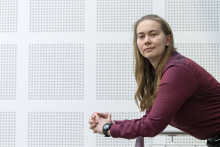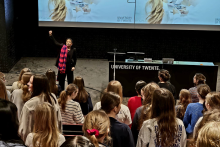‘Essentially I protect the electricity grid from bad people. I work on an intrusion detection system, sort of an antivirus software, that prevents hacking. Fortunately we don’t experience many large blackouts, but there are certainly people who could take it all down. At the moment, electricity grid is set up in such a way that taking one part down leads to a domino effect. Take one part out, it might all fall apart. My work is contributing to changing that. I enjoy working on this topic because of the urgent problem statement. My work can really change something in the world. It is research for the future to make our electricity grid safe.
verena menzel
PhD research topic: Integrated distributed SCADA security through local approximations of power flow equations (ISoLATE)
Works at: The Mathematics of Operations Research group, Faculty of Electrical Engineering, Mathematics and Computer Science
Studied: Computer Science, University of Münster
Originally from: Germany
It has been an interesting journey. I started my PhD research in April 2021, during the pandemic. It was quite tough in the beginning, because it was just me sitting at home, reading papers. As a computer scientist, I don’t have a lab. It’s just me and my computer. Luckily, my PhD research follows up on my Master thesis, and so I wasn’t starting completely from scratch. However, the PhD environment is rather different compared to doing your Master. I didn’t expect to have so much freedom. I can have a large impact on the direction of my research, which is very nice.’

‘My background is in Computer Science as well as Chinese studies – an unusual combination. I enjoyed studying both, but I really liked the practical applications of computer science, and so eventually I decided to focus on that. I’ve always liked computer games. I was fascinated by our computer in the basement, and so I took a basic computer science course and just started coding. I was never afraid of trying new technology. You just push buttons and see what happens.
'In computer science, you can let your creativity and interests flow freely'
In computer science, you can let your creativity and interests flow freely. I love the happiness you feel when you solve a problem, it’s like solving a puzzle. I consider myself to be a digital crafts person. As a computer scientist, you are building something – not physically, but with a computer. You can wake up in the middle of the night, think of a cool app or a feature and make it. You can create whatever you like.’
‘On top of research, I’m a co-founder of a P-NUT (PhD Network of the University of Twente) group focused on supporting female and non-binary doctoral candidates. I really like this about the UT: there is a lot happening and you also have the possibility to start your own initiative.
'As a woman, you are not necessarily considered to be a proper computer scientist'
I see that there is a need to support women in science. I’ve experienced discrimination in my studies and while working at various companies. People doubt your expertise and make – what they think are – funny comments. As a woman, you are not necessarily considered to be a proper computer scientist. In companies I worked at, there were almost no women in technical positions. The percentage of women in science decreases the higher the position. Most of the time, this makes me angry and motivates me. If there is nobody else, then I will step up and do it. That is why starting a P-NUT group feels really nice. We are helping make the UT more inclusive. For example, we are now working together with the Diversity & Inclusion office, the Student Union and UReka, on providing free sanitary products on campus. At this point, bathrooms are not set up for a menstruating person. Sanitary products are a necessity, but there is nowhere to get them on campus. That should be taken into account.

My goal for the future is being a happy human. I don’t know if this will be in academia or in industry. I never really thought of myself as a scientist before my PhD, but that is slowly changing now. In our research group, we are jointly working on the energy transition. We are very interdisciplinary and we collaborate very well – possibly thanks to the different perspectives we all have. That is why we need more diversity in science. Diverse groups perform better. That is a scientific fact.’







